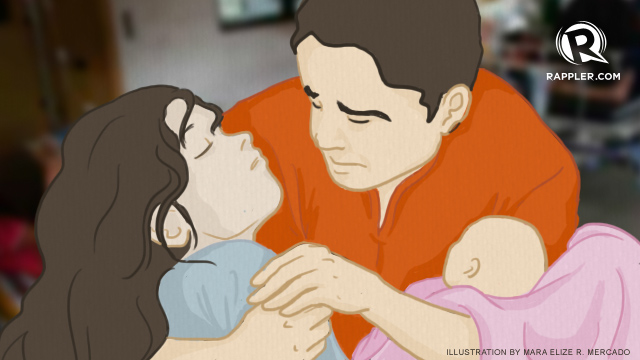SUMMARY
This is AI generated summarization, which may have errors. For context, always refer to the full article.

Exactly one year ago, on Dec 21, 2012, the Reproduction Health Bill was signed into law, providing universal access to reproductive health care services and information with priority given to poorer households. We are publishing 3 stories of women that show birthing complications and maternal deaths remain a tragic reality in the country. This is one of the stories. The other two are titled ‘Mernielyn: Downpayment for her baby’s life,’ and ‘A loaf of bread for Rosanna’s woes.’
MANILA, Philippines – When he heard groups were gathering stories about birthing complications, Abdul Ibno, a 29-year-old tricycle driver travelled all the way from Patikul in Jolo, Sulu to share his story. He says this is the first time he can describe his own feelings to anyone about what happened to his wife.
Here is his story.
***
Before noon of Aug 29, 2011, my wife Catherine, 23, started having abdominal pains.
“I think the baby will come out now so better look for a panday (also known as ‘hilot’),” she said.
I did as she told me and at 1 pm, the panday arrived. She ordered my wife to walk around. Then she told Catherine to lie down and rest.
The panday pressed gently on her abdomen. In a while, Catherine expressed fear about buelo or when the really strong contractions would begin. Within less than one hour of massaging, the contractions began. I knelt behind her and she clung to my forearms as she pushed.
The baby came out. I thought it looked purplish but the panday held the baby by her feet and hoisted her. She patted the butt and the baby began to cry. She then busied herself with wiping and cleaning the baby.
But Catherine was breathing very fast. So my mother-in-law and I helped the panday clean the baby up and hurriedly gave her to Catherine to breastfeed. Shortly after, the panday ordered me to get some amoxicillin.
“May sugat siya sa loob (She has a wound inside). “
What could she mean by that? Was something damaged inside when Catherine was pushing hard and the baby came out so fast?
I really didn’t know and maybe I should have asked, but I went to buy amoxicillin anyway. When I returned, I saw that Catherine had taken a turn for the worse.
Her color was so much darker and she was having a hard time breathing.
“She’s getting weaker!” I told the panday. I knew I must go and look for a jeep to bring her to the hospital.
Sickness from inside
For half an hour, I roamed the entire barangay in search of any kind of transport. Finally, someone led me to a jeep for which they charged me P150.
The hospital was about 11 kilometers away. In 20 minutes, we reached it. The doctor saw us right there in the lobby. He ordered the staff to put an intravenous drip on Catherine, and oxygen too. My wife did not wake up in spite of everything that was going on.
Her color was not all right. But Doc, he was quite busy with other patients. He told me to buy medicines and that I had to buy it in the drugstore that he himself owned. Not in the pharmacy of the hospital, he said, since only medical social service patients could buy there. So I rushed outside and I had to leave my wife with my cousin.
It was P2,000 worth of medicines.
I had not even packed my purchase when my cousin came in the drugstore saying, “Return those medicines now. Your wife is gone.”
I ran back to my wife.
Catherine lay there, lifeless. The staff said they would bring her to the Operating Room and do more exams.
“May sakit siya galing sa loob (She has a sickness from inside),” was all the doctor said.
My wife is dead – should I try to figure out what “galing sa loob” meant?
I buried her before dusk as our custom dictates and I gave sadakan to the panday, P1,500 each. The sadakan custom means to part with the earthly possessions of the dead. It is heartily given to the magliligo, those who give the final cleansing and bathing of the dead before they lay her down on the ground.
***
After the burial, Abdul sold his tricycle to pay for all the other expenses. Now he drives another operator’s tricycle part time and does some masonry on the side.
Abdul appealed to health authorities to make mobile clinics available for emergencies and pregnancy complications.
“Who says there are no mothers dying from childbirth? In faraway places like Patikul, it does happen.”
“I still can’t believe it happened even if my daughter is now almost 10 months.”
Abdul took a deep breath but struggled with his words: “My wife was alive and well and hoping that we could be a family. It really hurts.” – Rappler.com
Add a comment
How does this make you feel?
There are no comments yet. Add your comment to start the conversation.